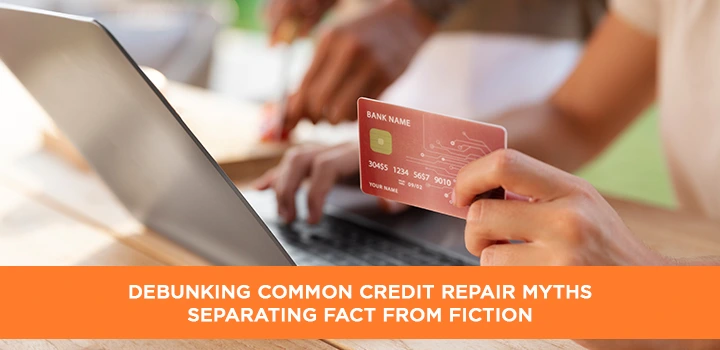
Helping customers discern reality from fiction and guarantee that they are making wise choices regarding their credit scores depends on busting typical credit repair rumors. Although it is a prevalent belief that credit repair firms are a hoax, honest businesses may help consumers raise their credit scores by spotting mistakes or areas of development on their credit record. While some say credit repair is unlawful or ineffective, the truth is the procedure is looking over a consumer's credit report for mistakes and unfavorable entries, then contesting those items with the creditors to fix errors. Another popular misconception is that regular credit report access calls for payment, but each reporting agency offers customers a free yearly credit report. By dispelling these common misconceptions, customers will be better able to grasp the credit repair process and act to raise their credit scores.
Top 4 Common Credit Repair Myths
Myth #1: Credit repair is illegal or unethical
This is just untrue. Many people believe that credit repair is either a dubious or unlawful activity. Credit repair is a genuine method of legally correcting credit records, nevertheless. Credit repair businesses are under the control of the Federal Trade Commission (FTC), which also lays rigorous rules to guarantee the ethical and legal operation of the procedure. One may legally fix their credit report by contesting erroneous or incomplete information with credit agencies. Credit restoration is a legal approach to legally enhance a damaged credit history and boost your good credit score. To exploit weak people, it is important to be careful of fraud artists who could present themselves as credit repair firms, nevertheless.
Myth #2: Credit repair is a quick fix
Although credit ratings may be raised, this doesn't happen overnight. Many businesses claim they can "fix" poor credit right away, but this is just not the case. Credit repair calls for time and work. Rebuilding credit calls for reducing debt and timely bill payments. Although many businesses claiming to "fix" credit will contest bad entries on credit reports, this is not always successful. While honest bad information will remain on a credit report for a certain period, mistakes may be eliminated. People have to realize that there is no such thing as a "quick fix" option; repairing credit calls for a constant, deliberate effort.
Myth #3: You can't do credit repair on your own
The third myth regarding credit restoration is that it can only be accomplished with help from a qualified business. This is just not accurate. Many tools are at hand to let people independently fix their credit. It is possible even if it may be a little more difficult and time-consuming. People might begin by looking over their credit reports, spotting mistakes and errors, and then challenging them with the credit bureaus. They may also help to lower balances and raise their debt-to-income ratio. There are also plenty of instructional tools accessible that could provide direction and ideas on raising credit ratings. Those who use the tools at hand and have a proactive attitude may effectively rebuild their credit on their own.
Myth #4: Credit repair is expensive
Many people believe that credit repair is a costly procedure. It does have a cost, although it is not as great as most people think. Factual data shows that most credit repair companies charge an initial inquiry cost and a monthly fee of as little as $80 per month. Given the major influence a high credit score has on one's financial future, this expense is far less than what most people believe. Furthermore noteworthy is the fact that credit restoration is not a service available just to credit repair firms. One may fix their credit for free by acting personally; various tools are accessible online to assist one through the process. Therefore, even if credit restoration does demand some expenditure, it is not nearly as costly as many believe.
Conclusion
In terms of credit restoration, it's crucial to keep reality and fiction apart. Many widespread misconceptions surround credit, like the idea that checking your credit report can lower your score or that closing unused credit accounts will raise your score. These claims, nevertheless, are untrue. Understanding credit repair means reading over one's credit report for mistakes and unfavorable entries and then challenging such items with the creditors. Moreover, developing a decent credit score does not depend on keeping a balance on your credit cards. Asking for your credit report won't lower your credit score; there is no financial situation—including bankruptcy—that will permanently damage your credit. Eliminating these credit repair fallacies can help people take the required actions to raise their credit and reach financial well-being.
Call on (888) 803-7889 & get free credit repair consultation now!
Resource
Top 10 Tips to increase your credit score
The Complete guide to improve your credit score
Step-by-Step Guide to Getting Approved for an Amazon Credit Card